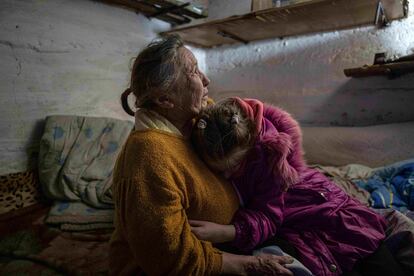In Ukrainian village, a family lives under cloud of shelling
Khrystyna Ksenofontova’s family chose not to evacuate their village in eastern Ukraine that lies 20 kilometers (13 miles) from the front line, even after her father was killed by a shell

In a small village in eastern Ukraine the sounds of war echo in the distance while 10-year old Khrystyna Ksenofontova plays. She pets the neighborhood cats, paints and, like everyone else here, hopes the fighting will end soon.
The small village of Bohoyavlenka, in Donetsk province, lies 20 kilometers (13 miles) from the active front line. Khrystyna’s days are spent scrounging the bits of childhood she still can. Her family refuses to evacuate and lives under a cloud of constant shelling. She wears headphones to block out the booms of the explosions.
“(I feel) fear, trembling,” she says. The explosions resound at night most of the time, she says, brushing aside her sandy blond hair. But sometimes they come in the morning, too.
Her mother, Yulia, and grandmother chose not to leave the village, which had a pre-war population of 1,400, after her father died from a brain injury suffered in an attack that destroyed one of their homes. They prefer to bear the brunt of the war in their hometown rather than be displaced and penniless, Yulia says.
It’s a common story along the dozens of towns and villages that span the 1,000-kilometer (more than 600-mile) front line in eastern Ukraine. Despite the severity of the fighting, many families have refused to leave their homes, rejecting evacuation attempts and choosing to risk their lives under bombardment. Aid groups concentrate on delivering food and supplying heating to these areas, where supplies are difficult to access.
The majority of those who stay are the elderly, many of whom rarely ventured outside their homes before the war. It is increasingly rare to find families with young children choosing to live so close to combat lines.
But Khrystyna still finds moments of delight amid the devastation.
In the basement, a litter of kittens was recently born. Picking up two, she smiles as their newborn eyes struggle to adjust to the light. She dreams of being a veterinarian.
All her friends have gone. The child finds ways to occupy her time by studying — when the power is on she studies online — and taking care of the cats.
Her grandmother — the mother of Khrystyna’s dead father — weeps, praying for normalcy to return to their lives.
Yulia strategizes ways to gather food to last the week. Sometimes the family travels to a nearby town where the supermarkets are still open. The shops, hospitals and schools in their village closed several months ago.
Like many residents in the area, her husband was a coal miner. Before the war he worked in the nearby hilltop town of Vuhledar, which has been the site of fierce fighting for months with Ukrainian forces still holding the town.
Yulia fears a much anticipated Russian counteroffensive expected in the spring will finally push them to leave. But where? She doesn’t know. She wishes she could see her mother in Russian-occupied Crimea, but that is impossible now.
“Everyone is worried about it (the potential counteroffensive),” she said. “Who knows, anything could happen.”
While she speaks, a distant boom thunders. She brushes it off. “It’s normal.”
Sign up for our weekly newsletter to get more English-language news coverage from EL PAÍS USA Edition
Tu suscripción se está usando en otro dispositivo
¿Quieres añadir otro usuario a tu suscripción?
Si continúas leyendo en este dispositivo, no se podrá leer en el otro.
FlechaTu suscripción se está usando en otro dispositivo y solo puedes acceder a EL PAÍS desde un dispositivo a la vez.
Si quieres compartir tu cuenta, cambia tu suscripción a la modalidad Premium, así podrás añadir otro usuario. Cada uno accederá con su propia cuenta de email, lo que os permitirá personalizar vuestra experiencia en EL PAÍS.
¿Tienes una suscripción de empresa? Accede aquí para contratar más cuentas.
En el caso de no saber quién está usando tu cuenta, te recomendamos cambiar tu contraseña aquí.
Si decides continuar compartiendo tu cuenta, este mensaje se mostrará en tu dispositivo y en el de la otra persona que está usando tu cuenta de forma indefinida, afectando a tu experiencia de lectura. Puedes consultar aquí los términos y condiciones de la suscripción digital.








































